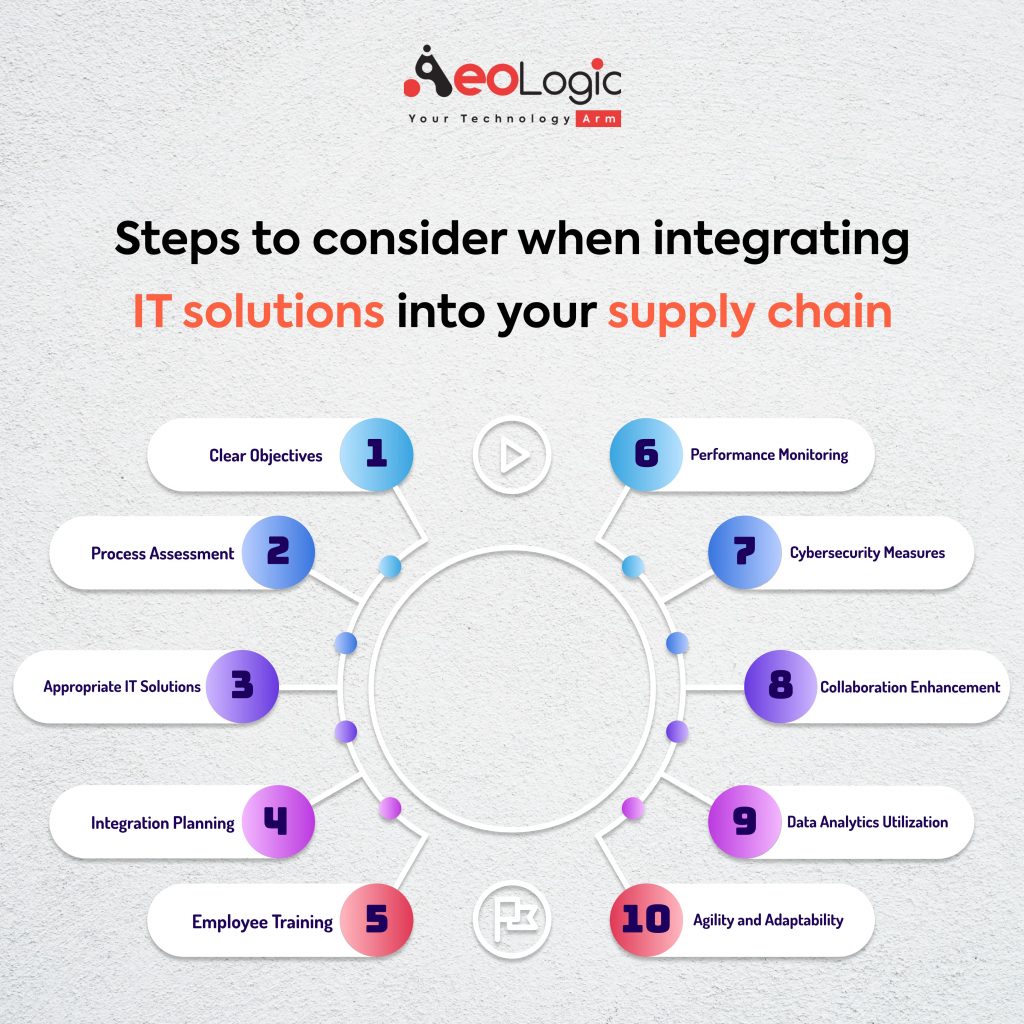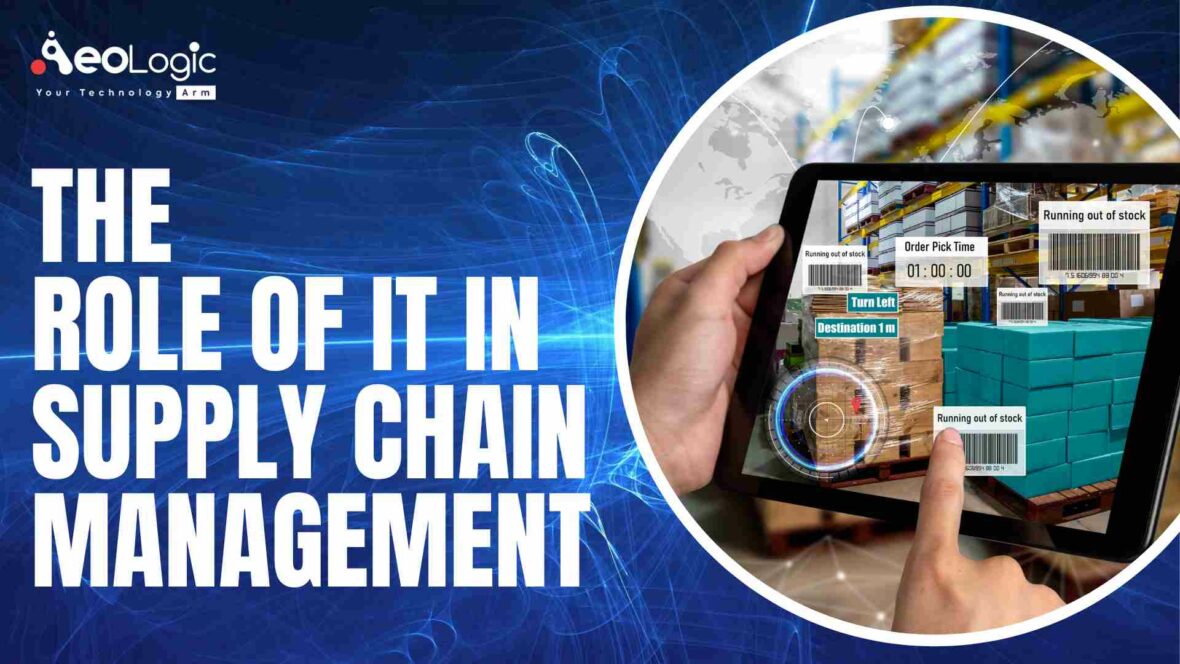Businesses are digitalizing their processes in the past couple of decades. And it is becoming a necessity rather than an option. Why not? It is integrating various operations carried out by different companies in the supply chain. The role of IT in supply chain management is to speed up business processes and prevent bottlenecks. Companies are closer to accomplishing on-time procurement, shorter inventory, and better efficiency, particularly in manufacturing. The role of Information Technology in supply chain management is so amazing, as IT is allowing companies in the supply chain for meeting the needs of consumers.
What is a Supply Chain?
A supply chain refers to the entire process of manufacturing and selling goods. Ranging from the supply of raw materials and using them to manufacture products to the distribution and sale to consumers. It is a network of companies, counting suppliers, manufacturers, shippers, distributors, and retailers. Moreover, these all are working together to make stuff like logistics, inventory management, transportation, and so forth go as smoothly as possible.
Also Read: How Modern Technology is Improving Food Supply Chain
Why is IT Important in Supply Chain Management?
The role of IT in supply chain management is so important. There are a lot of uses of Information technology in supply chain management. It is providing the tools which can pick up relevant information, and break it down for proper analysis. As well as helps in executing it for optimum supply chain performance. Data is pivotal to the operation of the supply chain. Primarily because it offers the base on which the supply chain managers are taking decisions.
Subsequently, real-time information is the key to proper supply chain management. With information about the various stages of the supply chain, decision-makers can strategize, manage, and adjust processes to accomplish goals in procurement, inventory, manufacturing, etc. these all are the points which are showing us the importance of IT in supply chain management and the uses of IT in supply chain management.
The Role of IT in Supply Chain Management
It is leaving a mark everywhere. No wonder each aspect of a business is now under its command! The role of IT in SCM is emphasized in the following.
1. Integrated and Coordinated Supply Chain
A supply chain can work efficiently when it is properly integrated and well-coordinated. IT is performing this important task by bringing in multiple technologies and combining them to optimize the supply chain. These technologies are making data collection possible and much easier and more accurate. Ultimately, this is allowing precise and detailed data analysis leading to sound business decisions.
2. Increased Productivity
A smooth flow of information, new technologies, and effective communication increases the productivity of all entities in the supply chain. It is like an initiation for product movement. Additionally, IT is building the link that passes the needed information continuously.
3. Cost Reduction
It permits the optimum utilization of assets and resources. Previous data is used to study the trends. And technology is used to analyze it for refining performance. When resources are being used optimally, they result in cost reduction.
The role of IT in SCM becomes more prominent as it motivates all parties to use their respective resources in the most cost-efficient approach. When IT is used as it should be, there is a dramatic decrease in overall expenses.
Also Read: Tech Solutions For Improving Supply Chain Management
4. Product Improvement
Furthermore, IT is consisting of tools and applications which can be used to attain early awareness. In a market where customers always want something new, the product will either have to evolve or else it will go out of demand. Therefore, to remain in business, you must present product improvement and innovation sooner rather than later.
5. Supply Chain Visibility
Consequently, information builds the whole supply chain visible to supply chain managers. How the information flows from one collaborator to the other and the effect it has on others is used by the managers in creating strategic decisions.
Must Read Blog for you: How to Implement RFID in the Automotive Supply Chain
Best Practices for Implementing IT in Supply Chain Management

Implementing IT in supply chain management can greatly enhance efficiency, visibility, and decision-making. Here are some best practices to consider when integrating IT solutions into your supply chain:
1. Define clear objectives
Start by identifying the specific goals you want to achieve through IT implementation in your supply chain. Whether it’s improving inventory management, streamlining order processing, or enhancing collaboration, having clear objectives will guide your IT strategy.
2. Conduct a thorough assessment
Evaluate your current supply chain processes, systems, and infrastructure to identify areas where IT solutions can make the most significant impact. Understand the strengths and weaknesses of your existing setup to determine the best IT tools and technologies to implement.
3. Choose the right IT solutions
Research and select IT solutions that align with your supply chain goals and requirements. Look for technologies that offer scalability, integration capabilities, real-time data visibility, and analytics to enable data-driven decision-making. Consider solutions such as transportation management systems (TMS), warehouse management systems (WMS), and supply chain visibility platforms.
Do you know? The Role of Traceability in the Textile Industry
4. Plan for integration and data synchronization
Ensure seamless integration of IT solutions with your existing systems and processes. Define data synchronization protocols to enable accurate and real-time information flow across different systems, such as ERPs, CRMs, and logistics platforms. Integration streamlines operations and minimizes errors.
5. Train and educate employees
Provide comprehensive training and education to your employees on how to effectively use the IT solutions implemented. Ensure that they understand the benefits, functionalities, and processes associated with the new technology. Encourage adoption and address any concerns or resistance by demonstrating the positive impact on their day-to-day tasks.
6. Monitor performance and make continuous improvements
Regularly track and analyze the performance metrics of your IT-enabled supply chain processes. Monitor key performance indicators (KPIs) such as cycle time, order accuracy, inventory turnover, and customer satisfaction. Identify areas for improvement and make necessary adjustments to optimize the effectiveness of your IT solutions.
Also Read: How to Improve E-Commerce Through Efficient Supply Chain Strategies
7. Establish cybersecurity measures
Implement robust cybersecurity measures to protect your supply chain data from potential threats. This includes using firewalls, encryption, multi-factor authentication, and regular data backups. Conduct regular security audits and stay updated on the latest security practices to safeguard your IT infrastructure.
8. Foster collaboration and communication
Leverage IT solutions to improve collaboration and communication among supply chain stakeholders, both internally and externally. Implement tools such as cloud-based platforms, document sharing systems, and collaborative planning systems to facilitate real-time information exchange, enhance visibility, and enable effective decision-making across the supply chain network.
9. Embrace data analytics and predictive modeling
Utilize the power of data analytics and predictive modeling to gain valuable insights into your supply chain operations. Leverage historical and real-time data to identify trends, forecast demand, optimize inventory levels, improve forecasting accuracy, and enhance overall supply chain planning.
Checkout our trending blog: Importance of Human Resource Management in Supply Chain
10. Stay agile and adaptable
Keep up with technological advancements and market changes to remain agile and adaptable. Regularly assess emerging IT solutions and industry trends to identify opportunities for innovation and optimization within your supply chain. Embrace change and be open to exploring new technologies that can drive continuous improvement.
By following these best practices, you can effectively implement IT solutions in your supply chain management, driving greater efficiency, visibility, and overall performance.
Functional Roles of IT in Supply Chain Management
Apart from the above-mentioned fundamental roles, there are three functional roles of IT in SCM. These are:
1. Transaction execution
When information is flowing efficiently between the participants of the supply chain, the number of transactions between them is decreased. Therefore, IT increases the efficiency of repetitive and frequent data exchanges. This data is generally suitable for delivery verification, order processing, billing, and dispatch advice.
2. Collaboration and coordination
It renders the flow of information. This makes for easier coordination, planning, and improved collaboration between all participants. Demand forecasting will be making it possible for planning for the future. As well as order tracking makes knowing the physical location of each order a reality. Neither of these activities is probable without IT.
3. Decision support
They are and should be based on data and information. Since IT is a mega benefit in decision support. It can help in collecting even the most complicated set of data. And it can convert them into easy-to-understand charts and reports. In this context, IT is extending decision support to all managers.
Above points show us the role of Information Technology in supply chain management or the functional role of Information technology in supply chain management.
Benefits of IT in Supply Chain Management
It has both a direct and indirect impact on supply chain management. There are a lot of benefits of IT in supply chain management. here is the list of benefits:
- Impact of IT in supply chain management improved access to information by providing quality information.
- Implementing IT in supply chain management help companies to reduce cost.
- It can also improve operational efficiency and provide better collaboration opportunities.
Future of IT in Supply Chain Management
Emerging technologies like AI and IoT solutions greatly impact supply chain management. In recent years supply chain management changed a lot. The role of technology in supply chain management is important. It makes inroads into supply chain management and changed the whole dimension of supply chain management.
Technology has made things easier than before that’s the reason every organization want to adopt new emerging technology into supply chain management. for example, Blockchain technology is one such technology that provides data security. So, all in all, the future of Information technology in supply chain management is bright. Technology will become the game-changer point in supply chain management.
Checkout our trending blog: Top Benefits of Outsourcing IT Support Services
Final Words
Nonetheless, the secret behind successful supply chain management remains in IT. We can’t even measure the importance of IT in supply chain management. From the very beginning of the supply chain to its end, data plays a crucial role in bringing the entire set together. IT equipment offers the necessary communication path between all entities. It is allowing them to work independently and yet in a coordinated manner. Therefore, the role of Information Technology in supply chain management or the importance of IT in SCM is unquestionable.
Make sure to get in touch with us. We’ll analyze the operations in your facility to find the best approach to increase your supply chain productivity.
FAQs
What are the applications of IT in the supply chain?
Applications of IT in supply chain management are not limited. There are various uses of IT in supply chain management. Organizations are moving towards the virtual supply chain with aid of quick changes in technology and applications of Information technology in supply chain management. Such as Electronic Data Exchange (EDI), Bar Code, Radio Frequency Identification (RFID), Electronic Commerce, Decision Support system, Enterprises Resource Planning (ERP) packages, etc. All these are the main applications of IT in supply chain management.
What is the supply chain in the IT industry?
Information Technology and supply chain management go hand in hand. Since, a supply chain is a network of all the individuals, organizations, resources, activities, and technology concerned with the creation and selling of a product. A supply chain encompasses everything from the delivery of raw materials from the supplier to the manufacturer through to its final delivery to the end user.
Related Blogs:
- How AI/ML Can Change the Public Transportation Industry
- Transforming Business With Digital Technology in the Oil Palm Industry in India
- Importance of Digital Asset Management in the Retail Industry
- How AI is Transforming the Agriculture Industry
- 10 Ways to Use Artificial Intelligence to Improve Business Processes
- The Future of IoT Technology in Convenience Stores
- Building Manufacturing Resilience Through AI and ML








